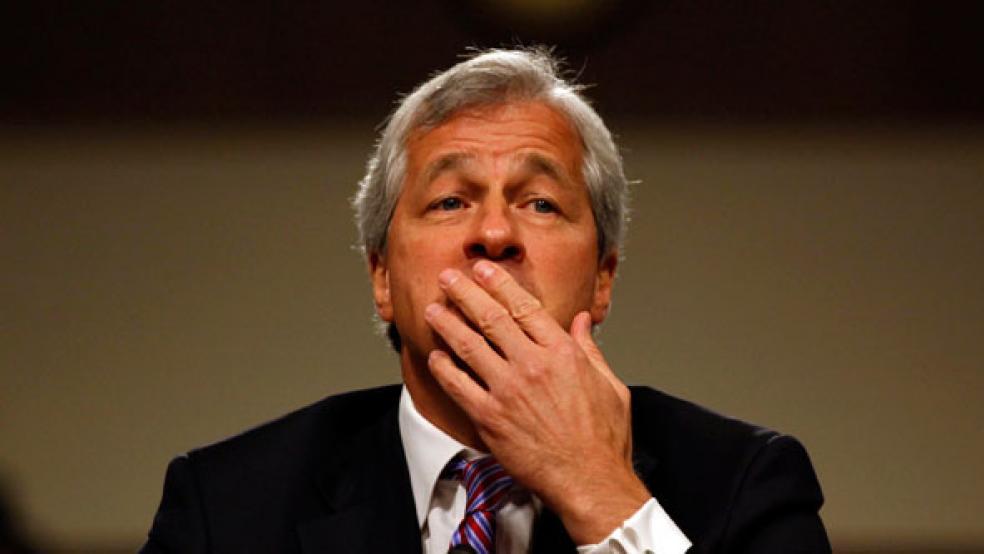JPMorgan Chase chief executive Jamie Dimon apologized again Wednesday during his appearance on Capitol Hill for not knowing what was going on in the bank’s London office last April when it unexpectedly posted a $2 billion loss.
But as the trades unfolded, he and the bank’s vaunted risk management committee weren’t the only responsible parties out of the loop as the trades unfolded. More than 100 bank regulators from the Office of the Comptroller of the Currency, the Federal Deposit Insurance Corporation and the Federal Reserve, who are permanently embedded at the bank to monitor its activities for safety and soundness, also weren’t aware of the size of the risk being taken on by “the London whale.”
That suggested to senators on from both sides of the aisle at yesterday’s Senate Banking Committee hearing that the regulatory agencies may not be up to the task of monitoring the sophisticated trading strategies deployed by large financial institutions, even after passage of the Dodd-Frank financial reform law.
“Is your bank too big to regulate?” asked Sen. Sherrod Brown, D-Ohio, after pointing out that JPMorgan had grown from $607 billion in assets in 1999 to over $2.3 trillion today. “As a practical matter, neither you nor the OCC can manage a bank of this size. ‘Too big to fail’ banks are too big to manage and too big to regulate.”
“Financial regulators are supposed to be monitoring the activities of banks like JP Morgan Chase to ensure that they operate in a safe and sound manner,” said ranking member Sen. Richard Shelby, R-Ala. “As we learned from the most recent financial crisis and this particular incident, regulators do not always meet our expectations.”
The sudden and as yet unexplained loss at JPMorgan dealt a setback to the banking industry’s efforts to scale back regulations contained in the Dodd-Frank financial reform bill. For the past year, they have been successfully skirmishing at regulatory agencies to delay or weaken implementation of the law and challenging the requirements that they set aside more capital to protect against potential losses.
Now, even Republicans, who are usually sympathetic to the banking industry’s complaints about excessive regulation, are taking populist-sounding positions against big money-center banks like JPMorgan. While lawmakers aren’t calling for more regulation or breaking up the banks, they are pushing for raising capital requirements. The Federal Reserve on June 7, as part of the international Basel III agreement, proposed raising the percentage of at-risk assets that banks with $500 million in assets must keep in reserve.
Dimon, in his prepared testimony testimony, dismissed the idea that higher capital standards would harm his bank, the largest in the world. He claimed that JPMorgan’s Basel III capital reserves were already “among the highest levels in the banking sector. . . We maintain extremely strong capital ratios, which remain far in excess of regulatory capital standards.”
“We will not make light of these losses, but they should be put into perspective,” he said. “We will lose some of our shareholders’ money – and for that, we feel terrible – but no client, customer or taxpayer money was impacted by this event.”
Other senators on the committee focused on the so-called Volcker rule, which would prohibit banks from using federally-insured deposits to engage in proprietary trading in derivatives and other speculative financial products. It would still allow banks to hedge against losses in their other positions, however.
And that distinction is the core question that regulators had to deal with when considering the flawed derivatives trading strategy at JPMorgan’s London office, which was part of a new scheme implemented in January to make money if the European bond market collapsed. JPMorgan has about $1.1 trillion in deposits, but only $700 billion in loans, which means its chief investment office manages a liquid assets portfolio of about $400 billion. Like virtually every large bank, it has parked some of that money in sovereign debt of European countries, and needed to hedge against sudden losses.
But as this spring’s Euro crisis unfolded and bond prices plummeted, the derivatives “insurance” began losing money, leading to accusations that JPMorgan had switched sides – that is, its London traders were in fact selling credit protection for European bond buyers – similar similar to what AIG had sold companies buying mortgage-backed securities prior to the 2008 financial crisis.
“Isn’t that really gambling?” asked Sen. Robert Menendez, D-N.J. “I don’t think so, no,” responded Dimon. “I would call it hedging.” Earlier, he had explained that “this particular portfolio was designed to make a lot of money if there was a crisis. The hedge was to improve our safety and soundness, not make it worse.”
Once the losses became apparent, the bank began unwinding the positions and the London office switched to its older method of hedging against the risks of a European bond collapse. “The hedge was supposed to improve our safety and soundness, not make it worse,” he said Dimon.
With the Volker rule still under consideration, it is not clear that the regulatory agencies had the authority to call the trades into question even if they had been paying attention.





